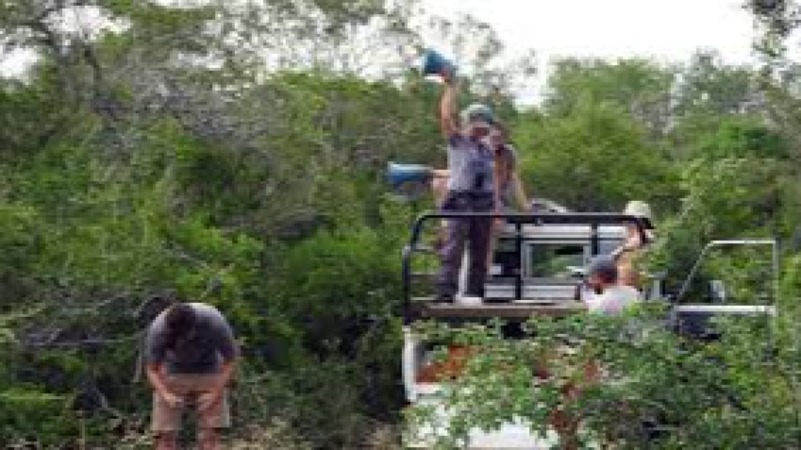Wildlife Conservation Training Course
Wildlife Conservation Training Course designed to equip individuals with the cutting-edge knowledge and practical skills required to address complex ecological challenges
Skills Covered

Course Overview
Wildlife Conservation Training Course
Introduction
The global biodiversity crisis necessitates a new generation of skilled and passionate conservation professionals. Wildlife Conservation Training Course designed to equip individuals with the cutting-edge knowledge and practical skills required to address complex ecological challenges. The program focuses on an applied, hands-on approach to wildlife management, habitat restoration, and human-wildlife conflict mitigation. Participants will gain a deep understanding of conservation science, sustainable development, and community-based conservation, preparing them for impactful careers in a rapidly evolving field.
This course goes beyond traditional conservation theory, integrating modern technologies like GIS mapping, drone surveillance, and conservation genetics into its curriculum. We emphasize the critical importance of a holistic approach, recognizing that successful conservation outcomes depend on collaboration, effective communication, and ethical decision-making. By mastering these interdisciplinary competencies, graduates will be ready to lead and innovate, contributing to the long-term survival of species and the preservation of global ecosystems. This training is your gateway to becoming a leader in the fight for a biodiverse and sustainable future.
Course Duration
5 days
Course Objectives
- Master modern conservation biology principles and applied ecological methods.
- Develop proficiency in GIS and remote sensing for habitat mapping and wildlife tracking.
- Implement effective strategies for human-wildlife conflict mitigation and coexistence.
- Learn advanced techniques for endangered species recovery and population monitoring.
- Formulate and execute a comprehensive wildlife management plan for protected areas.
- Understand the dynamics of illegal wildlife trade and forensic conservation methods.
- Design and manage community-based conservation projects for local empowerment.
- Analyze the impacts of climate change and habitat fragmentation on biodiversity.
- Acquire skills in conservation finance and grant writing for project sustainability.
- Utilize conservation genetics to inform species management and breeding programs.
- Develop strong stakeholder engagement and communication skills for conservation advocacy.
- Conduct field-based biodiversity surveys and data analysis using statistical software.
- Integrate principles of sustainable tourism and ecotourism management into conservation.
Target Audience
- Early-career conservationists and recent graduates.
- Park rangers and wildlife officers seeking advanced training.
- NGO staff involved in environmental and conservation projects.
- Field guides and ecotourism professionals.
- Biologists and ecologists transitioning to applied conservation.
- Community leaders and members of indigenous groups involved in resource management.
- Researchers and students pursuing careers in conservation science.
- Policymakers and government officials working on environmental issues.
Course Modules
Module 1: Foundations of Conservation Ecology
- Principles of Conservation Biology.
- Biodiversity Assessment.
- Ecosystem Dynamics.
- Habitat Degradation.
- Case Study: The reintroduction of wolves to Yellowstone National Park, examining its ecological ripple effects.
Module 2: Applied Wildlife Management Techniques
- Population Monitoring.
- Wildlife Disease Management.
- Protected Area Management.
- Wildlife Forensics.
- Case Study: The African elephant conservation effort, focusing on anti-poaching strategies and population dynamics in a specific national park.
Module 3: Human-Wildlife Conflict and Coexistence
- Conflict Analysis: Identifying the root causes and drivers of human-wildlife conflict.
- Mitigation Strategies.
- Conservation Education.
- Stakeholder Mediation.
- Case Study: Human-lion coexistence projects in Kenya, highlighting successful strategies for reducing conflict and promoting community benefits.
Module 4: Geographic Information Systems (GIS) for Conservation
- GIS Basics.
- Habitat Suitability Modeling.
- Wildlife Corridor Mapping
- Remote Sensing.
- Case Study: Using GIS to track the migration patterns of migratory birds and identify priority conservation areas.
Module 5: Sustainable and Community-Based Conservation
- Community-Based Natural Resource Managemen.
- Ecotourism Development.
- Grant Writing.
- Conservation Finance.
- Case Study: The success of the CAMPFIRE program in Zimbabwe, where communities benefit directly from wildlife management.
Module 6: Policy, Law, and Ethics in Conservation
- International Treaties.
- Wildlife Law Enforcement.
- Conservation Ethics.
- Environmental Policy Analysis
- Case Study: The global effort to combat illegal ivory trade, focusing on policy changes and international collaboration.
Module 7: Climate Change and Biodiversity
- Climate Change Impacts.
- Climate-Resilient Conservation.
- Carbon Sequestration.
- Adaptation Strategies.
- Case Study: The conservation of polar bears in the Arctic, a prime example of a species threatened by climate change and habitat loss.
Module 8: Advanced Conservation Science and Technology
- Conservation Genetics.
- Data Analysis: Using R or Python for statistical analysis of ecological data.
- Drone Technology.
- Citizen Science: Engaging the public in data collection and conservation efforts.
- Case Study: The use of eDNA (environmental DNA) to survey for elusive species like the Siberian tiger in remote landscapes.
Training Methodology
This course employs a blended learning approach, combining online theoretical modules with intensive, hands-on field workshops. The methodology includes:
- Interactive Lectures.
- Practical Field Exercises: Hands-on training in real-world conservation settings.
- Case Study Analysis.
- GIS and Software Workshops.
- Capstone Project.
- Peer-to-Peer Learning.
Register as a group from 3 participants for a Discount
Send us an email: info@datastatresearch.org or call +254724527104
Certification
Upon successful completion of this training, participants will be issued with a globally- recognized certificate.
Tailor-Made Course
We also offer tailor-made courses based on your needs.
Key Notes
a. The participant must be conversant with English.
b. Upon completion of training the participant will be issued with an Authorized Training Certificate
c. Course duration is flexible and the contents can be modified to fit any number of days.
d. The course fee includes facilitation training materials, 2 coffee breaks, buffet lunch and A Certificate upon successful completion of Training.
e. One-year post-training support Consultation and Coaching provided after the course.
f. Payment should be done at least a week before commence of the training, to DATASTAT CONSULTANCY LTD account, as indicated in the invoice so as to enable us prepare better for you.